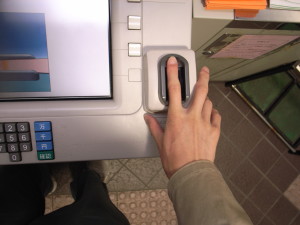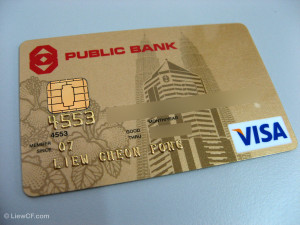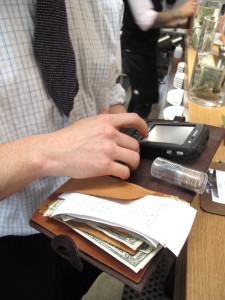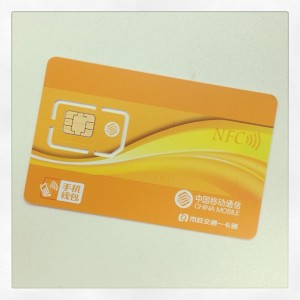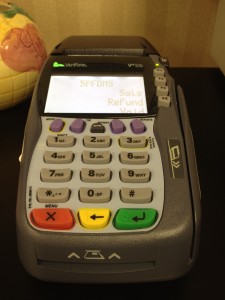February 21st, 2014 by Elma Jane

NationalTransaction.com QR Code
Emerging economies, such as the BRIC countries and the next layer of emerging markets, are seeing particularly fast growth of alternative payments, said Kevin Dallas, chief product and marketing officer for e-commerce at WorldPay. This means the complexity of the payment landscape will increase further. Merchants will need to ensure they understand diverging regional and sector trends in preferred methods of payment.
In three years alternative payments will eclipse credit card payments as the dominant way to pay online, according to a report yesterday from London-based e-commerce processor WorldPay. In Your Global Guide to Alternative Payments (Second Edition), WorldPay found card payments online, which accounted for 57 percent of transactions in 2012, will fall to 41 percent in 2017. Alternative payment methods (defined by the report as anything other than credit or debit cards including bank transfers, direct debits, e-wallets, mobile, COD and others) will rise to 59 percent of online transactions in the next three years. Part of the reason is the preferred payment methods in some of the fastest growing e-commerce markets are not cards.
The report predicts e-wallet transactions alone will equal the number of credit card transactions online at 41 percent, becoming the most popular method of paying online globally by 2017. Currently, PayPal is the most popular alternative payment method in the world with a market share of 57 percent. China’s Alipay is second at 20 percent.
Posted in Credit card Processing, Digital Wallet Privacy, e-commerce & m-commerce, Electronic Payments, Internet Payment Gateway, Mobile Payments, Mobile Point of Sale, Near Field Communication, Visa MasterCard American Express Tagged with: alternative payments, bank transfers, card payments online, cod, credit card payments, credit card transactions, debit cards, direct debits, e-commerce, e-commerce processor, e-wallet transactions, e-wallets, methods of payment, mobile, online transactions, pay online, paying online, payment, PayPal, transactions
January 13th, 2014 by Elma Jane
Most of the world has already migrated to EMV chip technology. EMV, as commentators have noted, affects not only hardware and software, but every card payment system, device and application. Looking ahead to the 2015 liability shift, stakeholders who have not made the switch should consider these benefits of EMV.
Rather than focusing on any potential expenses, however, stakeholders should instead consider the important elements they have to gain.
EMV is here.
Benefits of EMV:
Global interoperability – Since most of the world has migrated to EMV, U.S. banks can that transition gain the ability to have their cards used with full EMV security anywhere in the world. Further, merchants benefit from this global interoperability as it allows them to process transactions coming into the U.S. from foreign travelers in the same way as domestic transactions.
Higher security – The latest data indicates that 78 percent of all counterfeit card fraud originates in areas where EMV has not yet been widely implemented, and even the most ardent detractors of EMV admit that EMV is very secure.
All stakeholders, gain a higher level of security than was available through magnetic-stripe technology.
Roadmap to mobile – POS terminals that support contactless EMV will in turn enable mobile EMV on NFC at merchants, meaning merchants can take advantages of all manner of popular payment methods, as well as the latest loyalty, location-based and couponing capabilities of mobile.
Posted in Credit card Processing, Credit Card Security, EMV EuroPay MasterCard Visa, Mobile Payments, Mobile Point of Sale, Near Field Communication, Point of Sale, Smartphone Tagged with: card, card fraud, card payment system, chip, contactless emv, counterfeit, couponing, EMV, interoperability, magnetic stripe, Merchant's, mobile, nfc, payment methods, POS terminals, secure, Security, technology, transactions, transition, travelers
January 13th, 2014 by Elma Jane
Australia & New Zealand Banking Group plans to use voice biometrics for authorizing large-value transfers to external bank accounts via its mobile banking service.
The Australian newspaper said ANZ is still piloting the voice biometrics feature, which would enable its mobile banking customers to make payments of more than A$1,000 ($910 U.S.)… The current limit for external transfers to clients of other banks using its smartphone app. Customers would authorize a higher-value payment by speaking into their smartphones, and ANZ’s IT system would compare their voices to digital voiceprints stored on its server.
The voice biometrics system will likely be launched within the next 12 to 18 months, Phil Chronican, the chief executive of ANZ’s Australia operation, said during a Sydney press conference last week.
Chronican added that ANZ also plans to use voice biometrics for authenticating transactions initiated at its call centers.
ANZ will launch the revamped mobile apps that it has been developing as part of the “Banking on Australia” initiative in the first quarter of 2014.
ANZ’s three-year old GoMoney mobile banking app and its more recent FastPay small business mobile payments service will both be re-released with new navigation and personalization options, iTNews said.
Posted in Credit card Processing, Credit Card Security, Mobile Payments, Smartphone Tagged with: authenticating, authorize, authorizing, biometrics, digital, mobile banking, Mobile Payments, mobile transactions, payments, personalization, smartphone app, transactions
January 6th, 2014 by Elma Jane
It can be difficult for travel agencies to choose a merchant services provider. The credit card processing industry generally categorizes travel agents as a high risk business type due to the fact that most travel agency transactions take place long before the actual product or service is delivered to the customer. This leaves travel merchants open to chargebacks and other payment disputes, which are costly procedures that deter many merchant services providers from offering travel merchant accounts.
National Transaction Corporation is one of the travel merchant account providers and credit card processors to provide high risk merchant services for travel agents. Most providers are geared toward e-commerce business types, although some offer options for traditional travel credit card processing. National Transaction Corporation (nationaltransaction.com) is a Coral Springs, FL-based, NTC’s member bank is US Bank Minneapolis, MN; that offers high risk travel agent merchant accounts. NTC’s credit card processing, no holds on funding, integration with Trams, Sabre, and ARC business solutions, and payment gateways for e-commerce travel merchants. National Transaction Corporation’s parent company Elavon, has a grade of “C” award. The Better Business Bureau (BBB) currently grants National Transaction Corporation an “A+” grade, citing only one complaint in the last three years.
Posted in Credit card Processing, e-commerce & m-commerce, Electronic Payments, Internet Payment Gateway, Merchant Services Account, Travel Agency Agents Tagged with: chargebacks, credit card processing, e-commerce, high risk, merchant services provider, no holds funding, payment disputes, payment gateways, provider's, transactions, travel agencies, travel agency, travel agents, travel merchant account, travel merchants
December 5th, 2013 by Elma Jane
Three key benefits mPOS can provide PSPs. mPOS:
1. Maintains A Continuity Of Operations
mPOS solutions also ease the process of accepting and approving payments, according to the white paper. By enabling face-to-face card present transactions, mPOS allows transactions to be conducted in a highly secure manner. Further, once the encrypted transaction data is decrypted securely by the PSP at the payment gateway (with no access granted to the merchant), the onward presentation of the data into the acquiring network is consistent with that used historically for traditional POS terminals.
2. Simplifies Merchant Support
Thales suggests the biggest benefit to PSPs is that mPOS reduces the variety of costs PSPs need to cover to support merchants, cutting expenses related to equipment, security and PCI DSS compliance. This, the white paper says, allows PSPs that utilize mPOS to better allocate resources toward handling higher transaction volumes and acquiring business.
3. Supports Both Magnetic Stripe and EMV Cards
Another benefit to PSPs is that mPOS, despite its recent entrance to the market, is already widely available. The white paper explains that since the mPOS revolution quickly migrated from the U.S. abroad, mPOS solutions now exist to serve the unique needs of both markets. While this means challenges for merchants operating globally, PSPs benefit from being able to address the needs of merchants who want to opt for any and all available market solutions.
Much has been said about the recent explosion of the mobile point-of-sale (mPOS) market and how micromerchants are driving this payments revolution. But, what this story doesn’t communicate effectively is that small merchants aren’t the only stakeholders benefiting from the ongoing mPOS migration.
Payment service providers (PSPs) are another member of the mPOS value chain that can gain flexibility and security through these solutions, new research from data protection solution provider Thales suggests.
“Both merchants and PSPs have operational and logistical issues with traditional POS terminals associated mainly with the highly controlled and certified environment in which they must be used,” Thales writes in its latest white paper on the topic, “mPOS: Secure Mobile Card Acceptance.”
The 27-page white paper provides an extensive overview of the ongoing POS revolution, explaining how mPOS can reduce friction and costs for merchants, illustrating how the technology works step-by-step and highlighting the roles that each stakeholder plays along the value chain.
Posted in Electronic Payments, Mobile Payments, Mobile Point of Sale, Payment Card Industry PCI Security, Point of Sale, Smartphone Tagged with: acceptance, acquiring network, card present, compliance, decrypted, DSS, emv cards, encrypted, face-to-face, magnetic stripe, merchant, micromerchants, migration, mobile card, mobile point of sale, MPOS, payment gateway, payment service providers, payments, PCI, POS, psps, secure, securely, Security, terminals, transactions
November 22nd, 2013 by Admin
As we move to smartphones and tablets as payment methods security and privacy concerns are a real issue. With recent NSA leaks shedding light on our data and the access others have to it, we have to consider security, privacy and health implications. This year alone e-commerce transactions on smartphones and tablets during the holiday season are set to grow by 15%. Although tablets, not smartphones will drive the bulk of that growth, smartphones are set to overtake mobile-commerce payments over the next 5 years. Tablet payments in the U.S. alone are expecting to reach $26 billion in transactions. Currently tablets are more convenient for m-commerce due to their size, but as far as the future of electronic payment processing, smartphones are where it’s at.
The smart merchant sees this coming and realizes frictionless transactions increase sales. The more comfortable and less complicated a transaction is for a customer, the better. Smartphones, tablets, PCs, laptops and more can already process electronic transactions from credit and debit cards, gift cards, electronic checks and more. Money movement is easier than ever and more convenient than cash. Cash is king however in situations where internet connectivity and power are an issue. In India for example, a poor electric grid makes power outages a common occurrence. During natural disasters, when resources are badly needed, power outages or severed internet communications mean no electronic transactions can be processed. So physical currency remains a must, in the future we may see payment technology evolve to where digital money like crypto currency (BitCoin) may be stored on the device itself similar to having cash. As these electronic payment systems evolve, merchants need to position themselves to accept what their market prefers to transact with.
The smart citizen also sees this coming and has concerns that things like a National ID program being established may compromise their privacy.
As an extreme example of electronic transactions, a nightclub in Spain used subdermally implanted RFID chips in a woman that allowed patrons to pay for food and beverages without a credit card.
Posted in e-commerce & m-commerce, Electronic Check Services, Electronic Payments, Gift & Loyalty Card Processing, Merchant Services Account, Near Field Communication, Smartphone Tagged with: bitcoin, cash, connectivity, credit, crypto currency, currency, debit cards, digital money, e-commerce, electronic, electronic checks, frictionless, Gift Cards, health, internet, laptops, leaks, m-commerce, Merchant's, mobile-commerce payments, money, national id, nsa, pay, payment methods, payment processing, PCs, privacy, processed, RFID, Security, smartphone, tablets, technology, transact, transactions
November 18th, 2013 by Elma Jane
Big players are entering the merchant cash advance business and the industry’s smaller players are maturing. Meanwhile, the market is growing with the help of automated clearinghouse transactions.
The industry has caught the attention of high rollers who are transforming merchant cash advance into a mainstream option for funding small to midsize businesses.
In the past two years, venture capitalists and hedge funds have invested tens of millions of dollars in long-standing merchant cash advance firms and startups alike.
Meanwhile, big players such as PayPal and the card brands have launched their own programs to provide working capital to merchants.
The business has changed so much in the five years, it’s almost not the same business anymore, says a hybrid ISO and merchant cash advance company based in New York.
CEO of Capital Stack LLC, a merchant cash advance company in New York, has been monitoring the industry’s growth on his DailyFunder blog. He estimates that a year ago, there were about 50 merchant cash advance funders and about $1.5 billion in funding. This year, that number is north of 120, and the funding volume has doubled to $3 billion.
Counting mainstream funders such as Amazon and PayPal, which offer products that follow the cash advance model, the numbers are closer to $5 billion.
Until now, ISOs were using cash advances as an acquiring tool for credit card accounts. An estimate that of the 20 million to 25 million businesses in the U.S., about 5 million accept credit cards. When ACH opened up the remainder of those businesses for loans, the funding volume went off the charts. Now it’s going to grow 50-fold in a 10-year period, just because there are so many more businesses that are approvable.
The popularity of cash advance is good news for ISOs, who might have an easier time pitching the product to merchants because they already know about it and know to ask for it.
A number of factors have coincided to make merchant cash advances more attractive.
Previously, cash advances were associated with luring merchants into a high-rate source of cash. Funders could charge any rates they wanted because the industry was so unregulated. As the industry has matured, the more disciplined companies have survived, while the others have fallen by the wayside, and with the recession causing fewer banks to offer traditional loans, the market is wide open for alternative funders of all shapes and sizes to enter the fray.
The industry has also outgrown the one-size-fits-all pricing that once defined it. Before, all lenders set high prices. Now, companies rely on risk-based pricing, which means better clients get better deals, and ISOs can offer more competitive pricing. That changed the dynamics of the industry.
But the real change in merchant cash advance, members of the industry say, has been the widespread use of automated clearinghouse payment transfers. It used to be that merchant cash advance was available only to companies that accepted credit cards. Now with more businesses accepting payments online via ACH, there is another mechanism for collecting from merchants.
It took some time for people to accept people going into their bank account and debiting their account. Five or six years ago, no one would have allowed someone to do something like that.
Today, everybody’s fundable, as long as you have a bank account. Gone are the days when ISOs had to walk away from potentially big deals because the merchant didn’t accept credit cards, or didn’t have enough processing volume. ISOs and merchants now have more flexibility to walk into just about any business and offer financing. That’s why it’s mainstream.
Posted in Best Practices for Merchants, Financial Services, Merchant Cash Advance Tagged with: accept credit cards, accounts, ach, acquiring, Amazon, approvable, automated, clearinghouse, credit-card, funders, funding, high rate, high rollers, ISO, merchant cash advance, PayPal, traditional loans, transactions, unregulated, venture capitalist, working capital
October 31st, 2013 by Elma Jane
While credit card processors and retailers have made strides to combat credit card fraud, it is still rampant across the U.S. In fact, credit card fraud jumped 17 percent between January, 2011, and September, 2012, according to the most recent data from the FICO Falcon Fraud Manager Consortium.
Debit cards obviously have better safeguard measures in place, since debit card fraud rose less than 1 percent between January, 2011, and September, 2012. Plus, the average fraud loss per compromised account fell by 3 percent.
Card-not-present (CNP) fraud is the biggest challenge by far, accounting for 47 percent of all credit card fraud. CNP fraud – which includes payments via the internet, mail and phone – grew 25 percent over the two-year period. So, where the problems with credit cards lie.
Unfortunately, CNP fraud may get worse before it gets better, in FICO’s Banking Analytics Blog. This problem may even intensify as the US moves away from magnetic stripe and toward EMV [chip] card technology. In other countries adopting chip-based authentication technology, we’ve seen counterfeit fraud decline, but as a counterbalance, fraudsters often ramp up efforts around CNP fraud.
However, there was a glimmer of light in the credit card fraud fiasco. While card fraud attempts rose, the average loss per compromised account dropped 10 percent. Plus, the ratio of fraud to non-fraud spending remained constant. “In other words, the volume of card fraud increased proportionally to the volume of consumer credit card spending.
Even though many retailers have implemented successful fraud prevention programs, Visa provides retailers with the warning signs for CNP fraud, including:
Multiple cards used from a single IP address. Orders made up of “big ticket” items. Orders that include several of the same item. Shipping to an international address. Transactions with similar account numbers.
Posted in Digital Wallet Privacy, EMV EuroPay MasterCard Visa, Mail Order Telephone Order, Payment Card Industry PCI Security Tagged with: account, analytics, authentication, banking, big ticket, card-not-present, chip card, chip-based, cnp, counterfeit, credit-card, debit cards, EMV, fraud, fraudsters, international, internet, magnetic stripe, mail, non-fraud, orders, payments, phone, prevent, processors, retailers, safeguard, spending, transactions, visa
October 24th, 2013 by Elma Jane
Buoyed by an improving economy, business travelers are once again taking to the skies and spending more on corporate travel. The Global Business Travel Association has projected that $273.3 billion in travel dollars will be spent in 2013, and “that’s a whole lot of spending for corporate travel managers and individual business travelers to evaluate and track.”
Recognizing this problem, MasterCard launched Travel Controller on October 21. The new product is designed to give corporate users greater control over their travel expenses by directly addressing data concerns.
“Companies today are more than ever looking for more and better ways to help manage their corporate travel expense, to manage travelers that are outside of policy, and most importantly, reduce the amount of money they spend on travel.
Travel Controller is designed to be a modern solution to the problems posed by traditional lodge cards. Unlike these options, Travel Controller allows corporate users to identify individual travelers, trips and transactions, providing businesses greater insight into this spending than the available offerings that dominate the market.
Travel controller uses latest virtual card technology to generate a unique account number for each individual transaction, each hotel reservation and each ticket that’s purchased. And when its generating that card, it captures that data that’s important to the company for how they manage that.
Whether that’s the details of the transaction or things more specific to the trip or traveler or the way the company manages its budgets, all of this information is provided 100 percent of the time. This removes the headaches associated with central travel while still giving that control element that companies are looking for.
Travel Controller is around the goals of an end user organization, as a company that’s trying to manage their travel expenses more effectively.
There is a defined data set, and built in flexibility for companies to define their own customer-specific fields, that are important so that the data you get back isn’t just thousands of pieces of information, but rather its those things that are most important and its brought to you in a way that makes it easy to take advantage of.
Posted in Best Practices for Merchants, Credit card Processing, Financial Services, Merchant Services Account, Travel Agency Agents, Visa MasterCard American Express Tagged with: account, addressing, amount, association, business, card, controller, corporate, data set, dollars, dominate, element, expenses, generating, global, improving, individual, information, lodge, market, MasterCard, money, policy, reduce, spend, spending, traditional, transactions, travel, travelers, trips, unique, virtual
October 21st, 2013 by Elma Jane
Good time for merchants to start noting how their provider is handling card company fee changes as well as any future rate and fee changes, especially if your contract will expire in 2014.
October 2013 Rate and Fee Increase Notices
Visa, MasterCard, and Discover Credit card companies generally make rate and fee changes in the April and October time frame, although they have also made changes at other times of the year. Inevitably, some banks and merchant account providers seem to take advantage of the card company changes by increasing or adding their own mark-ups and by pointing too much of the blame at the card companies for the increases. This time around isn’t much different than others and merchants have sent me some rate and fee increase notices that go well beyond any card company changes.
In understanding how your provider is handling the latest card company changes, keep in mind that there are two important changes for October 2013:
Discover introduced a .25 cent increase to all transactions.
MasterCard introduced a .25 cent increase to certain transactions.
Below are two examples of recent notices on the October changes. Understanding the above .25 cent changes, how would you rate these providers?
Notice 1: 0.02 Percent + $0.02 Increase
“MasterCard, Visa and Discover typically evaluate the Interchange rates and fees twice per year most often in April and October. Based on recent changes as well as analysis from other network providers and vendors, the following changes to your merchant account are being implemented and will be reflected in your merchant statements for transactions processed beginning in October:
Interchange Plus Merchants: Percentage charged in excess of Interchange will increase by 2/100ths of a percent; and
Transactions Fees for all authorized transactions will increase by $0.02/transaction.”
Tiered Pricing Merchants: Qualified Rate for Visa, MasterCard and Discover will increase 2/100th of a percent;
Notice 2: 0.40 Percent Increase
“Effective October 1, 2013, the discount rates charged for your Visa, MasterCard, and Discover (as applicable) credit card and non-PIN (signature) debit card transactions will increase by 0.400%. We have increased these charges based on a variety of factors, including recent Card Organization changes and our own pricing considerations. This change will appear beginning with your October month-end statement you will receive in November.”
Your Statements Now go back to the statements you received in August and September or any notices you received via mail and read the notice your provider posted for these changes. Did the provider announce the actual change or did it state something quite differently? If it’s the latter, make sure it adjusts pricing accordingly. Also, make sure you monitor your rates, fees, and notices going forward to determine the best long-term course of action. If the provider needs you to extend your contract to correct its overcharges, then there are probably bigger pricing issues and more assertive action required by you to investigate your overall processing cost.
EMV Capable Terminals
To reduce fraud in the U.S., the card companies are introducing cards that have a chip as well as the current magnetic strip. Chip cards are prevalent outside the U.S. and EMV — Europay, MasterCard, and Visa — established the technical standards for processing them.
Brick-and-mortar merchants should understand about EMV.
Brick-and-mortar merchants should have equipment capable of processing EMV chip card transactions by October 2015 as certain fraud liability will shift from the bank that issued the card to the merchant. The equipment may be a terminal or a chip card reader attached to the terminal or POS system.
Certain credit card transactions will require a PIN number instead of a signature similar to PIN debit transactions today. Also, like the current PIN debit devices, each chip reader will need to be encrypted and the encryption code is processor specific. Therefore, if a merchant has an encrypted device, changing processors may be more costly as the encryption cannot simply be downloaded over the phone or Internet as is done with terminal reprogramming now. Instead, the encrypted device will need to go back to the provider for encryption or swapped with an encrypted device or a new encrypted device may be needed.
“EMV capable” can mean very little. In fact, if you have purchased or leased an “EMV capable” terminal it may simply mean that it has the slot or contactless connection to place the chip card and the terminal may have the capability to eventually be encrypted to actually process chip cards. However, the cost and time required to do so could be prohibited.
However, merchants should be planning to have equipment capable of processing chip card by October 2015. In fact, they should be planning to have the equipment capable of processing chip cards well ahead of the October 2015 — perhaps as early as late 2014, to ensure receiving it in time.
If a merchant’s existing terminal fails or is no longer supported, the merchant should inquire about EMV terminals as a replacement. However, ask if it comes fully encrypted and capable of actually processing an EMV transaction or if it will need the encryption later. Right now, the answer is likely that the terminal will need encryption later. If so, the merchant should obtain the time frame, process, and cost for enabling the terminal to actually process chip cards. This should be in writing. Remember, new terminals cost the provider around $150 to $250 and the encryption may be an extra $25 to $50.
Make sure you are comfortable with your provider and have negotiated the best processing cost before changing to encrypted EMV equipment.
Merchants do not need EMV terminals today and very few providers actually have terminals that can process an EMV chip card transaction right now.
Posted in Credit card Processing, Electronic Payments, EMV EuroPay MasterCard Visa, Visa MasterCard American Express Tagged with: authorized, banks, chip card, contactless, cost, credit-card, debit, devices, Discover, EMV, encrypted, fee, increase, interchange, MasterCard, merchant account providers, network, overcharges, percent, percentage, PIN, POS, pricing, processor, prohibited, rate, rate and fee, statements, terminal, transactions, visa

